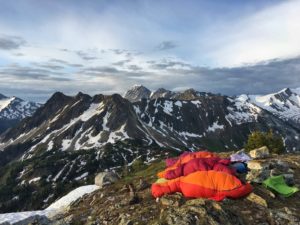 Beep! Beep! Beep! I wake up to the frenzied sound of alarms, and tiredly roll over in my damp sleeping bag. It is 4 a.m. and five of my Conservation Across Boundaries classmates and I are heading to the top of the mountain above our camp. We slowly tumble out of our tents, grab our sleeping bags and head out over the rocky terrain. The sky is still dark with only the faintest hint of light off to the east. The only sound that fills the air is the faint rushing of Glacier Creek miles down in the valley below us. We scramble up the last pitch and spot the cairns that mark the top of the mountain. The land is still bathed in shadow, and we sit in our sleeping bags waiting for the sun, while enjoying the last moments of darkness. My toes tingle from the warmth of my sleeping bag and the clouds on the horizon begin to turn pink. The sky begins to light up and soon everything around us looks like a freshly painted watercolor. The clouds become brighter and brighter, every moment more beautiful than the last. We run around taking pictures and enjoying the view, and then as the pink light fades and is replaced by the warm colors of morning we climb back into our sleeping bags. We sit in silence taking everything in, and I am filled with an overwhelming sense of gratitude for this place and the opportunity to be here.
Beep! Beep! Beep! I wake up to the frenzied sound of alarms, and tiredly roll over in my damp sleeping bag. It is 4 a.m. and five of my Conservation Across Boundaries classmates and I are heading to the top of the mountain above our camp. We slowly tumble out of our tents, grab our sleeping bags and head out over the rocky terrain. The sky is still dark with only the faintest hint of light off to the east. The only sound that fills the air is the faint rushing of Glacier Creek miles down in the valley below us. We scramble up the last pitch and spot the cairns that mark the top of the mountain. The land is still bathed in shadow, and we sit in our sleeping bags waiting for the sun, while enjoying the last moments of darkness. My toes tingle from the warmth of my sleeping bag and the clouds on the horizon begin to turn pink. The sky begins to light up and soon everything around us looks like a freshly painted watercolor. The clouds become brighter and brighter, every moment more beautiful than the last. We run around taking pictures and enjoying the view, and then as the pink light fades and is replaced by the warm colors of morning we climb back into our sleeping bags. We sit in silence taking everything in, and I am filled with an overwhelming sense of gratitude for this place and the opportunity to be here.
Four years ago I watched the Patagonia Film Jumbo Wild and was transfixed by the beauty and wildness of the area. The film told the story of the controversy over the planned construction of a multi-million dollar resort in Jumbo Valley, British Columbia. On one side of the issue you have Oberto Oberti, a Vancouver based architect from Italy. He and his developers proposed the idea of Jumbo Glacier Resort in 1991. Then on the other side of the issue are the local environmental groups, first nations and community members who want Jumbo Valley kept wild.
Jumbo Valley has been considered sacred land, by the local First Nation of the Ktunaxa, for 400 hundred generations and holds an important place in their culture. Jumbo valley is also an extremely important anchor habitat for grizzly bears. There are tremendous expenses that would come with the infrastructure needed to support the resort, and these expenses would have to be paid for by the taxpayers of local towns. While a large amount of controversy has surrounded this issue Oberti and his developers remain stubborn in their efforts, and the issue remains in legal limbo after more than 20 years of discussion.
After watching the film I continued to stay up to date on the issue and told myself that I would go to British Columbia one day to better understand the issue and to witness such a unique place. Now, here I am sitting in my bright orange sleeping bag looking out over Jumbo Valley and Glacier Dome. On this course, I have had the opportunity to meet locals who have fought for years in the defense of Jumbo Valley. I have heard their thoughts and their personal stories surrounding the issue, and have been immersed in the landscape. I have camped on Jumbo Pass, and I have gotten to sit in the grass and the snow, to listen to the wind, and the rain, and while I only have a small understanding of this place, I have begun to form a relationship, I have begun to listen to the land and to learn its story.
4 Replies to “Ernesta McIntosh: The Last Frontier”
Comments are closed.
Beautiful! Your post took me there. Good job and bravo for making the effort to go up to the top too! The mountains are sharing powerful perspectives with you. And you described it all so well.
I’m so intrigued that you have immersed yourself in this beautiful landscape & controversy. We need new younger eyes on these issues to help guide the future. Enjoy your days out west – I look forward to hearing about the perspectives you gain this summer!
So evocative and thoughtful. Informative and interesting as well as entertaining. A wonderful experience fully realized.
Your writing is the prettiest writing of all the writing